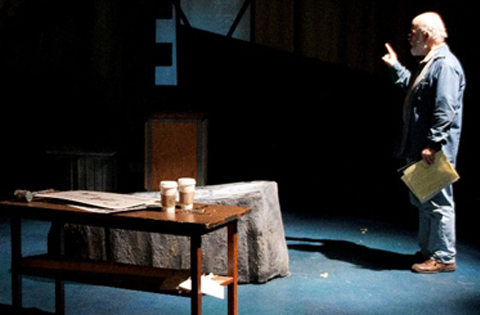|
|
2018-2019 University Catalog [Archived Catalogue]
BFA in Directing, Playwriting + Production
|
|

Amy Dugas Brown, Program Director
ambrown@uarts.edu
215.717.6572
C O N T E N T S
Description
The Bachelor of Fine Arts in Directing, Playwriting + Production (DPP) provides education and training in theater making and leadership across three disciplines.
The Directing, Playwriting + Production (DPP) curriculum trains the generative theater artist who wants to write, direct, produce, and/or stage manage theater. The DPP Program builds future theater leaders who have rigor, imagination, and a deep and diverse skill set. All coursework develops the student’s ability to lead through collaboration in order to reach their artistic goals with vibrancy and immediacy.
Coursework begins with a strong base of script analysis, stagecraft, style exploration, theater history, and dramaturgy. All students take the first level of each core discipline: directing, playwriting, and stage management. From there, each will deepen in one, and often two, of the disciplines. Courses in producing, design, performance, and new play development further round out their skill set. Each student takes six credits of professional internships, as well as Business of Theater, I Am My Own Company, and Theater Management, which allows them to bridge meaningfully into the professional landscape post graduation. All students take six credits of Senior Project, which results in a festival that further develops their artistic and productorial skills and is attended by professional theater artists so that students may showcase their work. Artistic innovation, leading through collaboration and entrepreneurship are at the core of this curriculum.
Program Objectives
In addition to the Learning Outcomes of the Brind School of Theater Arts , Directing, Playwriting + Production graduates will be able to:
- Effectively analyze scripts and source material, apply research, and make specific choices about world building that serve both the needs of the script and the artist’s imaginative impulse.
- Lead a collaboration, specifically communicating and effectively realizing their artistic goals and aesthetic.
- Work deeply and adroitly in at least one of the three component disciplines (directing, playwriting, and/or management) in the service of initiating an artistic project, building it from the ground up and seeing it through to completion.
- Assess different theater producing models, both nonprofit and commercial, as well as theater company structures and organizational functions.
Academic Plan
Academic plans provide a semester by semester suggested course sequence. Plans can be customized through discussions with academic advisors.
Program Requirements (120 credits)
|
Major Requirements (69 credits)
- THEA 152 Script Analysis 3 credits
- THEA 161 Collaboration in Theater 3 credits
- THEA 220 Exploration of Style 3 credits
- THEA 221 Dramaturgy 2 credits
- THEA 355 Playwriting I 3 credits
- THEA 460 Business of Theater 1 credit
- THEA 499 Internship 3 - 12 credits complete 6 credits
- THPD 122 Introduction to Production Practicum 1 credit complete this course two times for a total of 2 credits
- THPD 130 Stagecraft 1 credit
- THPD 261 Stage Management I 3 credits
- THPD 262 Theater Management 3 credits
- THPD 320 Production Practicum 1 credit 1complete this course two times for a total of 2 credits
- THPD 350 I Am My Own Company 3 credits
- THPD 461 Senior Project 3 credits
- THPD 462 Senior Project 3 credits
- THST 120 Approaches to Acting: Practice and Technique 2 credits
- THST 121 Approaches to Movement: Practice and Technique 2 credits
- THST 250 Director/Design Collaboration 3 credits
- THST 361 Directing I 3 credits
- THST 440 New Play Workshop 3 credits
- Take 1 course from THST 132 Set Design , THST 231 Lighting Design , THST 232 Costume Design , or THST 235 Projection Design 3 credits
- Take 1 course from THEA 356 Playwriting II , THPD 361 Stage Management II , or THST 461 Directing II 3 credits
- Take 1 course from THEA 456 Playwriting III , THPD 475 Advanced Management , or THST 462 Directing III 3 credits
- Take 1 course from THEA 457 Playwrights’ Workshop , THPD 476 Contracts and Law , or THST 463 Director’s Workshop 2 credits
- Complete 3 credits of elective coursework outside of the Directing, Playwriting, + Production major 3 credits
Discipline History (9 credits)
Critical Studies (33 credits)
First Year Writing (6 credits)
Students will complete a writing placement exam to determine their composition sequence. Students who do not complete the exam may be placed based on standardized tests scores (if available) or high school GPA. Some students may be required to complete additional developmental coursework.
Students will complete one of the following sequences:
Critical Approaches to the Arts and Culture (9 credits)
- Select 3 courses from subject CRIT
Scientific Inquiry Foundation Track (3 credits)
- Select 1 course from subject SIFT
Critical Studies Electives (15 credits)
- Select courses from subjects:
- AHST (Art History), HIST (History)
- FRCH (French), ITAL (Italian), LITT (Literature)
- PHIL (Philosophy), RELI (Religion)
- MATH (Math), SCIE (Science)
- ANTH (Anthropology), PHIL (Philosophy), PSYC (Psychology), SOCI (Sociology)
- STCU (Cultural Studies), STDA (Dance Studies), STGS (Gender & Sexuality Studies),
STMU (Music Studies), STPF (Performance Studies)
- Select courses from : Art History or Critical Studies Elective.
Electives (9 credits)
- Complete 9 credits of free electives. This requirement is satisfied by any undergraduate course that isn’t required by the program.
|
|
|